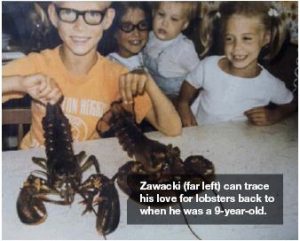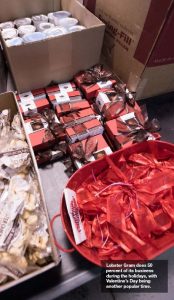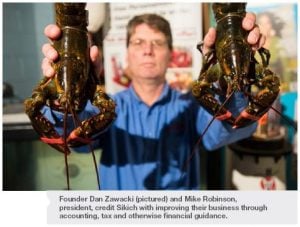His Crustacean Kingdom: Lobster Gram Goes from Startup to Seafood Sensation
by: IN Motion, Sikich Quarterly Business Magazine, Issue 8 Spring/Summer 2015
Some of the world’s most famous companies were garage startups -Amazon, Apple, Disney and Nike, to name a few - proving that entrepreneurs don’t necessarily need all the bells and whistles to ultimately become successful. What’s rare, however, is realizing success after starting a business out of the trunk of one’s car.
But that’s what Dan Zawacki, founder of Lobster Gram, did nearly 30 years ago. A Honeywell sales rep at the time, Zawacki closed many big contracts. After a few years in the business and a growing customer base, his schedule could no longer accommodate taking all his customers out to dinner during the holiday season, prompting his search for a unique client gift to give instead.
 “I worked with a lot of engineers, so I thought steaks— but everybody does steaks,” said Zawacki. “I thought about fruit, but I couldn’t imagine going to those engineers and saying, ‘Here’s a nice pear or a fruit basket.’ Finally, I thought about something that I’ve always loved - lobsters.”
“I worked with a lot of engineers, so I thought steaks— but everybody does steaks,” said Zawacki. “I thought about fruit, but I couldn’t imagine going to those engineers and saying, ‘Here’s a nice pear or a fruit basket.’ Finally, I thought about something that I’ve always loved - lobsters.”
Zawacki immediately called a wholesaler in Maine and had hundreds of live lobsters shipped to the Peoria (Ill.) Airport, where he picked them up and put them in the trunk of his car.
“I drove around to all of my clients for three days with these lobsters in the trunk of my car,” said Zawacki. “I would take two of these live lobsters that were just crawling around, put them in a plastic bag with a lemon and stick of butter, and tie them with a little bow.”
A few months later, one of Zawacki’s biggest clients - who also happened to be a close friend and mentor - encouraged him to start a business selling live lobsters. And though he was still selling at Honeywell, Zawacki
spent the next year documenting what he would need to do to get this business off the ground and started executing on the list.
After being in business for three months and selling six packages, Zawacki’s sister suggested he ask Chicago radio host Jonathan Brandmeier for some air time - to which Brandmeier agreed. Zawacki told his boss he
would be making cold calls remotely, drove to Chicago and was on-air for 10 minutes. He sold more than 180 packages that day.
“The show was in the morning, so I drove back to my office in Peoria that day,” said Zawacki. “As soon as I walked in the door, my boss called me into his office and I knew I was busted. He said, ‘Zawacki, where were you?’ I couldn’t lie to his face, so I told him I was on the radio in Chicago doing this lobster thing. I was let go on the spot.”
Uncertain of his next steps, Zawacki called his parents, who offered his old bedroom in a Chicago suburb and half of their garage for his crustacean warehouse. The only caveat: He had six months to make it work or he would get booted out.
It worked. Zawacki was able to buy a threeflat that served as his office and apartment, with a two-car garage serving as the Lobster Gram world headquarters warehouse. With one lobster tank and a small freezer, he
shipped a dozen or two packages a day.
“I was doing everything at this point - answering the phones, customer service; this was way before the Internet,” said Zawacki, now affectionately known as Dan the Lobster Man. “When I was able to hire my first employee - my sister Linda - things progressed from there.”
 Lobster Gram's Chicago warehouse and corporate. The ocmpany's main distribution center is located in Biddeford, Maine.
Lobster Gram's Chicago warehouse and corporate. The ocmpany's main distribution center is located in Biddeford, Maine.Today, Lobster Gram has a 4,000-square-foot warehouse and an office in Chicago’s Albany Park neighborhood. The company also has an 18,000-square-foot facility in Biddeford, Maine, out of which the Lobster Gram team shipped tens of thousands of packages in 2014.
Though delivering live lobsters is what Lobster Gram does best (and most often), the company believes highly in client customization for both items ordered and delivery date. In addition to live or cooked lobster tails in a variety of sizes, customers can order shrimp, crab, steak, chowder and even desserts and appetizers. Lobster Gram takes a final extra step by adding lemon, butter, crackers and the accessories required to
properly eat the shellfish.
 Getting to this point of success is never simple, and Lobster Gram’s story has been no exception. Like many other companies, Lobster Gram experienced a brutal period during 2008 and 2009, when consumers stopped spending what disposable income they had. Though the company’s sales dropped 30 percent during those years, it is now more profitable than pre-recession. Zawacki attributes much of the company’s rebound to customer service, his employees and a high-quality product.
Getting to this point of success is never simple, and Lobster Gram’s story has been no exception. Like many other companies, Lobster Gram experienced a brutal period during 2008 and 2009, when consumers stopped spending what disposable income they had. Though the company’s sales dropped 30 percent during those years, it is now more profitable than pre-recession. Zawacki attributes much of the company’s rebound to customer service, his employees and a high-quality product.
 “Someone recently said that we’re a thoughtful company, which I thought was very unique,” said Zawacki. “For instance, we had a big snowstorm this past winter in the Northeast, where our facility in Maine is located. We had three feet of snow in our parking lot so we could not ship; we had about 300 orders going out that day. We called, not emailed, every single person and told them the situation. I give a lot of credit to my team at Lobster Gram. We have really good people; people who are much smarter than me.”
“Someone recently said that we’re a thoughtful company, which I thought was very unique,” said Zawacki. “For instance, we had a big snowstorm this past winter in the Northeast, where our facility in Maine is located. We had three feet of snow in our parking lot so we could not ship; we had about 300 orders going out that day. We called, not emailed, every single person and told them the situation. I give a lot of credit to my team at Lobster Gram. We have really good people; people who are much smarter than me.”
“The other thing that makes us successful is having a great product, though it might sound cliché. In the lobster business you can get different grades of lobster. We always get the best lobsters. Similarly, we could use
margarine or milk for our chowder and it would be a lot cheaper, but it wouldn’t be as good—so, we use real butter and cream.”
 But as all business leaders know, with great successes come great challenges.
But as all business leaders know, with great successes come great challenges.
“Lobster Gram’s greatest challenge is and will continue to be the fact that we are a gifting company,” said Zawacki. “That’s how Lobster Gram was built, and that’s how people know us. We’re very cyclical. We do 50 percent of our business during November and December for the holidays.”
Although they sell the most during those eight weeks, Zawacki and his team have made strides in smoothing out the other 10 months with spikes during Valentine’s Day, Mother’s Day and Father’s Day, and a year-round partnership with QVC. The highly cyclical nature of the business is just one reason why Zawacki, along with Lobster Gram’s president Mike Robinson, rely on Sikich to better the business through accounting, tax and otherwise financial guidance. According to Robinson, his team at Sikich has helped Lobster Gram overcome a number of challenges, including categorizing the company’s financial statements properly; implementing QuickBooks and finding an accessible, personable partner.

“It’s very difficult in today’s business environment to find someone who talks to you in English and doesn’t try to impress you with everything, which includes tax rules and regulations,” said Robinson. “The Sikich team has given us an informal board of directors. We can call them on anything, whether for tax questions or, quite frankly, just general business questions for which we really need a sounding board.”
“We’ve seen cost reductions working with Sikich because they look at it as if they’re our partner in the business,” Robinson continued. “They make recommendations that we haven’t even considered. They step in and take charge, allowing us to focus on our business—vital for a small, growing company.”
In fact, focusing on the business—particularly increasing the company’s client base—is Zawacki’s biggest goal for Lobster Gram in the next year.
“During the recession, we became more of an operational company, trying to cut our costs and get them in line,” said Zawacki. “This year, we’re focusing on bringing new names to file through proactive marketing, rather than reacting with our operations.”
 Since Zawacki is part of the company’s target audience, it shouldn’t be too difficult for Lobster Gram to meet this goal.
Since Zawacki is part of the company’s target audience, it shouldn’t be too difficult for Lobster Gram to meet this goal.
“One of the first questions people ask me is if I still eat lobster. I eat them at least once a week.” Laughing, Zawacki mentioned he thinks of it as research and development.
And given his high-in-shellfish diet, Zawacki could be considered an expert in cooking the crustaceans.
“What I like to do is bake it on the grill and baste it in butter. However you cook it, though, don’t overcook it. If you’re boiling it, which is the easiest way, the rule of thumb is about one minute per ounce. Take it out earlier rather than later and check on it. You can always put it back in and finish it off.”
Lobster Gram offers many more tips on cooking shellfish in The Lobster Gram Learning Center, a part of its new website that includes cooking guides, cooking videos, recipes and more.
“I believe in what we’re doing; we provide joy and fun and experiences to the people who receive our packages,” said Robinson. “It’s our mission to provide that fabulous product and that experience. We provide happiness, and if somebody’s not happy, we work to make them happy.”